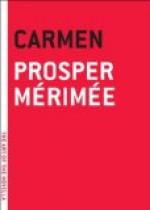The nouns of number are almost the same in every case. The German dialect seems to me much purer than the Spanish, for it has preserved numbers of the primitive grammatical forms, whereas the Gitanos have adopted those of the Castilian tongue. Nevertheless, some words are an exception, as though to prove that the language was originally common to all. The preterite of the German dialect is formed by adding ium to the imperative, which is always the root of the verb. In the Spanish Romany the verbs are all conjugated on the model of the first conjugation of the Castilian verbs. From jamar, the infinitive of “to eat,” the regular conjugation should be jame, “I have eaten.” From lillar, “to take,” lille, “I have taken.” Yet, some old gipsies say, as an exception, jayon and lillon. I am not acquainted with any other verbs which have preserved this ancient form.
While I am thus showing off my small acquaintance with the Romany language, I must notice a few words of French slang which our thieves have borrowed from the gipsies. From Les Mysteres de Paris honest folk have learned that the word chourin means “a knife.” This is pure Romany—tchouri is one of the words which is common to every dialect. Monsieur Vidocq calls a horse gres—this again is a gipsy word—gras, gre, graste, and gris. Add to this the word romanichel, by which the gipsies are described in Parisian slang. This is a corruption of romane tchave—“gipsy lads.” But a piece of etymology of which I am really proud is that of the word frimousse, “face,” “countenance”—a word which every schoolboy uses, or did use, in my time. Note, in the first place, the Oudin, in his curious dictionary, published in 1640, wrote the word firlimouse. Now in Romany, firla, or fila, stands for “face,” and has the same meaning—it is exactly the os of the Latins. The combination of firlamui was instantly understood by a genuine gipsy, and I believe it to be true to the spirit of the gipsy language.
I have surely said enough to give the readers of Carmen a favourable idea of my Romany studies. I will conclude with the following proverb, which comes in very appropriately: En retudi panda nasti abela macha. “Between closed lips no fly can pass.”



